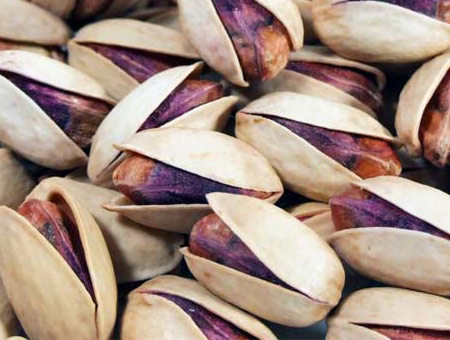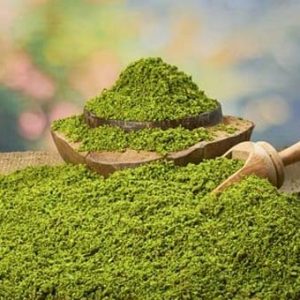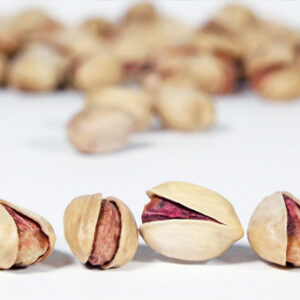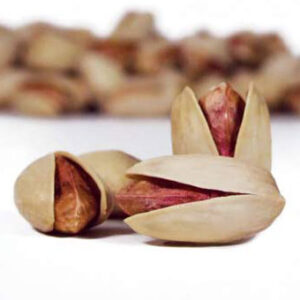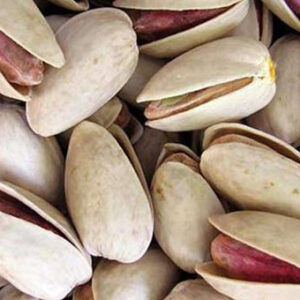Characteristics of Akbari Pistachio
Akbari pistachio is a very long and well-shaped pistachio (Super Long) that has customers almost all over the world. This popularity can be attributed to various factors, as per pistachio experts. Due to its easy peeling, Akbari pistachio offers a delightful sensory experience, often considered a luxurious pistachio.
In terms of pricing, it usually commands a higher price than Fandoghi pistachios. Akbari pistachio trees do not bear fruit abundantly each year; they typically yield significantly every few years.
This scarcity contributes to the consistently low availability of quality Akbari pistachios in the market, thereby keeping the price elevated.
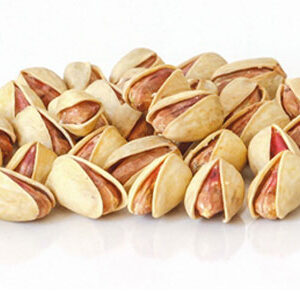
The Origin of the Name “Akbari” in Pistachio Cultivars
Naming pistachio cultivars lacks a precise scientific foundation and is generally based on the name of the individual who cultivated the tree.
Prominent Pistachio Cultivars in Rafsanjan
Notable pistachio cultivars in Rafsanjan include Pistachio Ahmad Aghaei, Akbari, Sefid Pistachio Nogh, Fandooghi, Koleghoochi, Qazvini, Mohammad Aghaei, Ouhadi, (Ebrahimi, Red, Agah, Vahidi), Haftadataei, Pistachio Jabbari, Seif al-Dini, Mumtaz, Shahpsand, Badami Zarand, and many others. Each cultivar often carries the name chosen by its developer, based on their expertise in pistachio agriculture, which becomes popular among people.
General Advantages of Akbari Pistachio and Reasons for its Popularity
When fresh and hand-picked, Akbari pistachios are perfectly roasted (toasted), offering a crunchy and delectable taste, a significant reason for their popularity. Akbari pistachios are long and visually appealing, often perceived as luxurious. Moreover, they are easier to peel, requiring minimal effort, making them an attractive choice, especially for those with long nails.
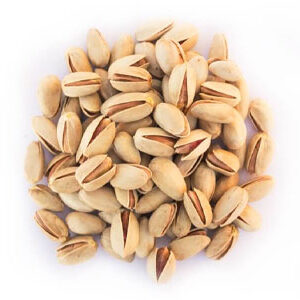
Advantages of Transplanting Akbari for Farmers
Compared to other cultivars, Akbari pistachio possesses distinct properties that can cater to market demands, though no specific study has conclusively proven its superiority in properties. The recent welcoming reception of Akbari cultivar in Iran is not solely due to its higher prices and economic profitability but also because Akbari pistachios require less water, making them favorable in drought conditions.
Disadvantages of Akbari Pistachio for Farmers
The Akbari pistachio tree, while large and leafy compared to other cultivars, is more susceptible to pests such as psyllids. If left unchecked, it can lead to leaf shedding. Unlike Ahmad Aghaei, annulation (shedding of leaves) is a common occurrence in Akbari trees, even with adequate care. Consequently, harvesting substantial yields every year is challenging; at best, it yields every alternate year.
Pistachio trees need a period of winter cold to thrive. For Ahmad Aghaei and Fandoghi trees, this requirement is less stringent and typically met every year. However, Akbari trees need around 1200 hours of cooling at temperatures below 6 degrees Celsius. This cooling period is crucial for their growth and productivity, which is not guaranteed in every winter, especially in recent times.
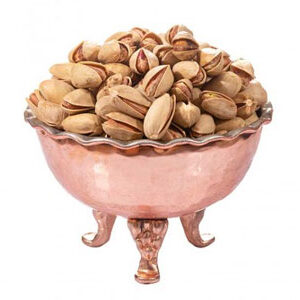
Recommendations for Planting Pistachio Trees and Establishing an Orchard
Careful consideration must be given to selecting pistachio trees, as it significantly impacts their future growth and productivity. Standard suitable pistachio rootstocks in Iran include the Zarand almond rootstock, which is cost-effective (priced under ten thousand tomans).
Alternatively, the UCB1 (American hybrid) rootstocks are recommended for their resilience to salinity and environmental stresses, facilitating faster growth and allowing transplantation in the second year. Although hybrid rootstocks come at a higher price, the profitability of pistachio investment after six years justifies this choice.
When choosing the right location for pistachio cultivation, thorough research is necessary. If pistachio trees thrive in an area nearby, it’s likely they will do well in your land too.
Characteristics of Akbari Pistachio Trees
- Medium growth power with an expansive growth habit.
- Average tree height is 3 meters.
- Leaf length is 4.15 mm (medium), and leaf width is 4.4 mm (low).
- Terminal leaflets are larger than lateral leaflets.
- End leaflet shape is broad spear-like.
- Clusters of this pistachio type weigh approximately 51.6 grams, with each dried pistachio weighing around 15.4 grams.
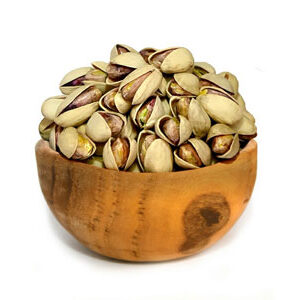
Akbari Pistachio Fruit Traits
- The skin’s tip is green, turning red when ripe.
- The bone skin’s fracture position on the abdomen and back is equal, resulting in a rectangular pistachio shape.
- The upper color of the kernel is purple-brown, with a dark cream bone skin color and a purple-brown kernel surface.
- The background color of the kernel is light yellow, with fruit ripening starting from the tip.
- Dried pistachios are 12.22 mm in length (high) and 61.12 mm in width (high).
Fruiting of Akbari Pistachio
- Rapid kernel growth begins on July 10th, with fruit ripening around September 31st (late).
- The flowering season for this cultivar starts on April 21st (late flowering) and ends on April 26th, lasting for approximately 11 days.
Export of Akbari Pistachios
- Akbari pistachios do not readily obtain significant EU standard certifications due to stringent health standards in EU countries.
- A major challenge is obtaining aflatoxin certification, as Akbari pistachios stay on the tree longer than other varieties until full ripeness and harvest. This extended period increases susceptibility to aflatoxin pests in the later stages of the harvest season.
- However, exporting to Indian and Arab markets remains a viable option for Akbari pistachios.


